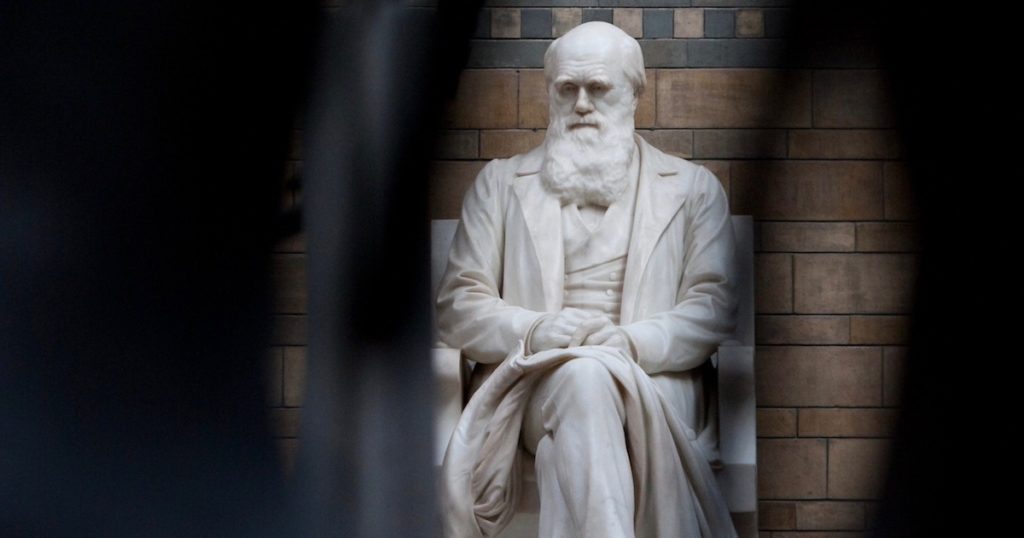 Evolution
Evolution
A Darwinist Recognizes (Some of) the Stakes in the Intelligent Design Debate

Here is a Darwinist with a fair and clear-headed understanding of the intellectual and spiritual stakes in the evolution debate. Or rather, some of the stakes. Jamie Milton Freestone is a postdoc at the University of Queensland’s Institute for Advanced Studies in the Humanities. Writing at Areo, he asks bluntly, “Does Darwinism Conflict with Religion?”
He’s probably right that many people, including otherwise thoughtful ones, don’t give the question any serious thought. And he’s right that it all depends on how you understand what “evolution” means. His comments on intelligent design are remarkably civil, and I was amused by his designation of our colleague Michael Behe as “the intelligent design equivalent of [Richard] Dawkins.” That might not be too far off.
Gould, Dawkins, Rosenberg
Freestone concludes that evolution, if you do think about it seriously, probably can’t be reconciled with religious belief. He cites the thought of Stephen Jay Gould, Dawkins, Alex Rosenberg, and proponents of the extended evolutionary synthesis as “options,” along with intelligent design, and asks, “So what should be said about Darwinism’s implications?” His answers:
1. It can only describe the natural world, so keep it separate from human concerns, which you learn about in civics class or Sunday school. (Gould’s view.)
2. It explains everything in nature and rules out God, but we can make our own purposes because we evolved to do so. Phew. (Dawkins’ view.)
3. If Darwinism were true it certainly would destroy all human purpose and meaning, and we’d be left with nihilism. Luckily it isn’t true and the irreducible complexity of living things is evidence of a designer. Phew. (Intelligent design.)
4. The neo-Darwinian orthodoxy is too harsh. We need to promote a non-supernatural but still more expansive version of Darwinism that allows for life’s creativity and agency. (Some advocates of a scientifically respectable version of vitalism and some people’s take on the extended evolutionary synthesis.)
5. Darwinism appears to be nihilistic because it is. Its baleful implications for politics and morality are an important part of the theory and the sooner we take the bitter pill the better. (Rosenberg’s view.)
Gould as “Wildly Wrong”
He rightly dismisses Gould’s strategy of reconciliation:
Stephen Jay Gould, a more irenic Darwinian, tried to separate science and religion into “non-overlapping magisteria,” arguing that they simply answer different questions, so they needn’t be in conflict. This is wildly wrong for multiple reasons. First of all, religions clearly pronounce on factual questions all the time. Second, science often pronounces on ought questions. Third, what about all the other domains, like the arts, humanities and social sciences, where do they fit in? Fourth, is it even possible to separate is and ought?
Once Gould is eliminated, it comes down to evolution that indeed forces us to decide between atheism — one that is thoroughly nihilistic or cautiously allows for (the illustion of) purpose — or intelligent design. I don’t see any evidence of Freestone’s wrestling in detail with arguments for ID. But the candor and, as I said, civility of his writing deserves commendation.
A Universal Image
One might add, though, that there are additional stakes in the origins debate. Yes, the coherence of a religious viewpoint is one point balanced on the knife’s edge. But there’s more. The “God hypothesis,” as philosopher of science Stephen Meyer calls it in his book that comes out in March (Return of the God Hypothesis: Three Scientific Discoveries that Reveal the Mind Behind the Universe), allows for a divine image imprinted universally upon the human race. As the Bible’s language puts it, God’s image is reflected in man much as a man’s image is imprinted in his children. What that means exactly is enigmatic, but it demands a recognition of equal human dignity regardless of skin color or ethnicity. What is a human being? That may be a still more profound consequence of the intelligent design controversy than the one that is the focus of Freestone’s article.
John West’s documentary Human Zoos powerfully summarizes some of the baleful history of how Darwinism has encouraged racial and eugenic horrors from the 19th to the 20th to the 21st century:
Take away the idea of a transcendent image shared by all humans equally, and you are left with a nightmare in which grading humans by race, condemning some and exalting others because of their pigmentation, becomes a definite option. Darwin’s theory gave a powerful boost to pseudo-scientific racism, as various neo-Nazis and white nationalists down to our day recognize and celebrate. In fact, I’ve never heard a good answer to the question: Given the premise of Darwinism, why would you expect humans to be equal?
I would be curious to hear how Darwinists like Dr. Freestone reconcile their evolutionism not just with religion but with their commitment, assuming they are committed, to human equality and human dignity. That would make a fine topic for a further essay at Areo.
